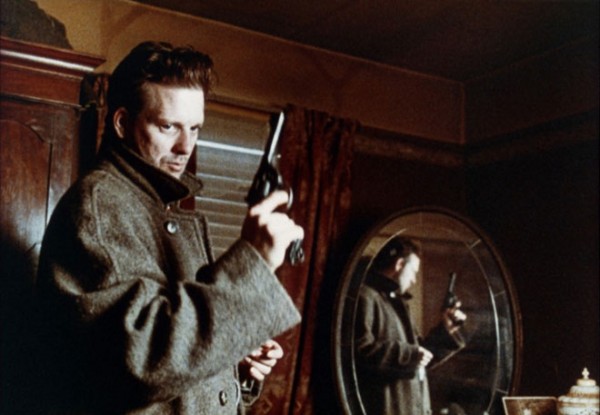
Alan Parker’s Angel Heart (1987) is an experience in total atmosphere and mood. There is only one way to adequately describe the sensation and affective power of the film: pressure cooker intense. Tension, intrigue and fear bubble up, all the way to boiling point…then the burn kicks in hard. Despite featuring such bold stylisation, It seems amazing to me that Angel Heart is not regarded among the best of 1980’s cinema, and even worse, not considered one of the the best examples of neo-noir cinema.
Upon its release, the violence and sexual content of the film courted controversy, leading to a box office total that barely topped the film’s cost. The film has since received something of a cult status over the years thanks to video and DVD, but Angel Heart is a film deserving of even more exposure. While its excessive aesthetic and graphic content might not be to all tastes, Parker’s juxtaposition of gritty realism and lurid surrealism mark it as a modern classic ripe for a new generation to explore.
Angel Heart is the noir drenched story of private investigator, Harry Angel (Mickey Rourke). Set in 1955, the film sees Angel hired by the sinister Louis Cyphre (Robert De Niro) to track down Johnny Favourite, a popular musician who disappeared after the Second World War. As Angel begins his investigation, strange events begin to unfold; people linked to Favourite are murdered as Angel gets close to them, and he begins to enter a world of mystery, voodoo and death, leading him to confront the darkness in his own heart and soul.
The film’s bizarre and mysterious narrative, coupled with the thick, pounding atmosphere, is reminiscent of Robert Aldrich’s classic noir, Kiss Me Deadly (1955). Indeed, it could be argued Angel Heart has the feel of Kiss Me Deadly filtered through the lurid world of the occult and supernatural, rather than Aldrich’s eye for modernism and science twist. Parker’s film has an identity unique to itself; few films have such a complex and fluid identity in the history of American film. It is film noir, horror film, period film, post-war exploration, supernatural thriller, and detective fiction.
Visually, the film is a a macabre canvas of blacks, greys, browns and deep reds; a pallet that reflects the physical focus upon the body, and its vulnerability, within the film: sweat, blood, viscera and smoke coalesce in the atmosphere, reinforcing the dark and grimy mood that lingers on every frame. Parker’s distinctive eye for startling, affective imagery can be seen at its most affective in Angel Heart, particular in his use of abstract flashbacks, focusing on repeated motifs; a hooded woman scrubbing blood off of a wall, a makeshift altar littered with filth, and an expressionistic elevator descending into the dark. This aesthetic strategy reaches the peak of its atmospheric power when the montage of flashback imagery blurs into a graphic sex scene, turning water dripping from the ceiling into blood falling onto the back of Angel and turning the scene into something elemental and horrific.
Parker takes the audience from the faded frozen streets of Harlem to the sweltering heat of New Orleans, as Harry falls further down the rabbit hole. The juxtaposition between these two locations reflects that of realism and surrealism within the film. In Harlem, the religious fever of the church is framed as a money making scheme, with the preacher demanding that god needs the parishioner’s money. However, in New Orleans, the bizarre voodoo worshiping that Harry witnesses is primal: close ups on sweating bodies, the bright heat of a roaring fire and the thick blood of an animal sacrifice slick in the light. This is a scene of true belief in dark magic, that unsettles deeply.
The film’s casting is pitch perfect for the dark world portrayed and the noir tone of the narrative. In particular, Mickey Rourke’s performance as Harry Angel is remarkable; Rourke completely convinces as a film noir lead, embodying the iconic role of the traumatised and damaged post-war male, a figure that defined film noir after the Second World War. However, it is the physical and emotional deterioration of Angel throughout the film that marks Rourke’s performance as the best of his career; Rourke delves deep inside himself and pushes his emotions to hysterical levels in order to portray a man whose very soul is ripped bare.
Angel Heart is a film that alludes definition. A breathtaking film that is unquestionably one of the great examples of neo-noir; a searing character study that grips tight and cuts deep as it drags the audience further and further into the grimy, sweaty and supremely atmospheric world of Harry Angel. A pressure cooker ready to explode.















{ 2 comments… read them below or add one }
I never forgot such a great film. And hope other film lovers too. One of the best neo noir films I ever watched. Yes, it is mysterious and reminds on classic noir films.
This was my favourite film of all time for a long time – it’s still up there with those I’ve most enjoyed and is probably still my favourite horror film. Neo-noir is a new term to me, but yes, it fits that definition well.